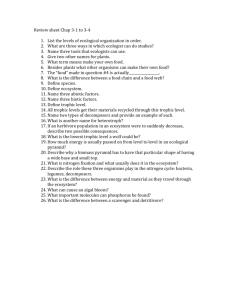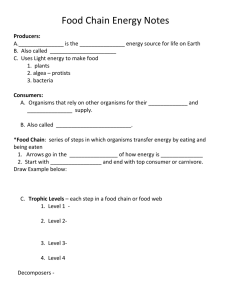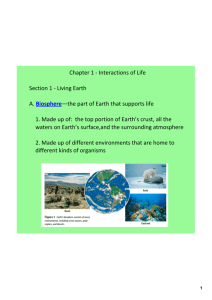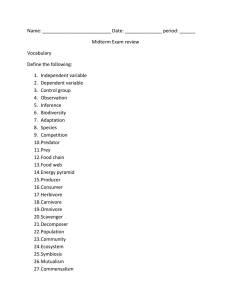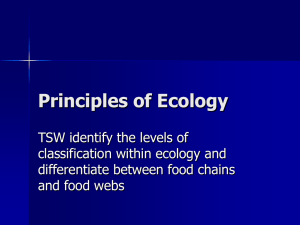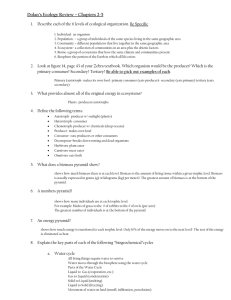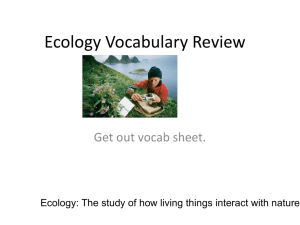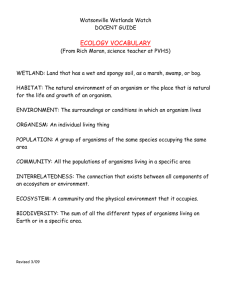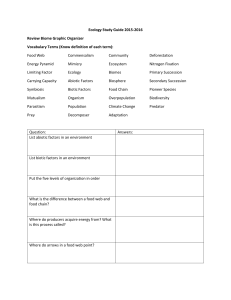Ecology Study Guide: Key Concepts & Definitions
advertisement
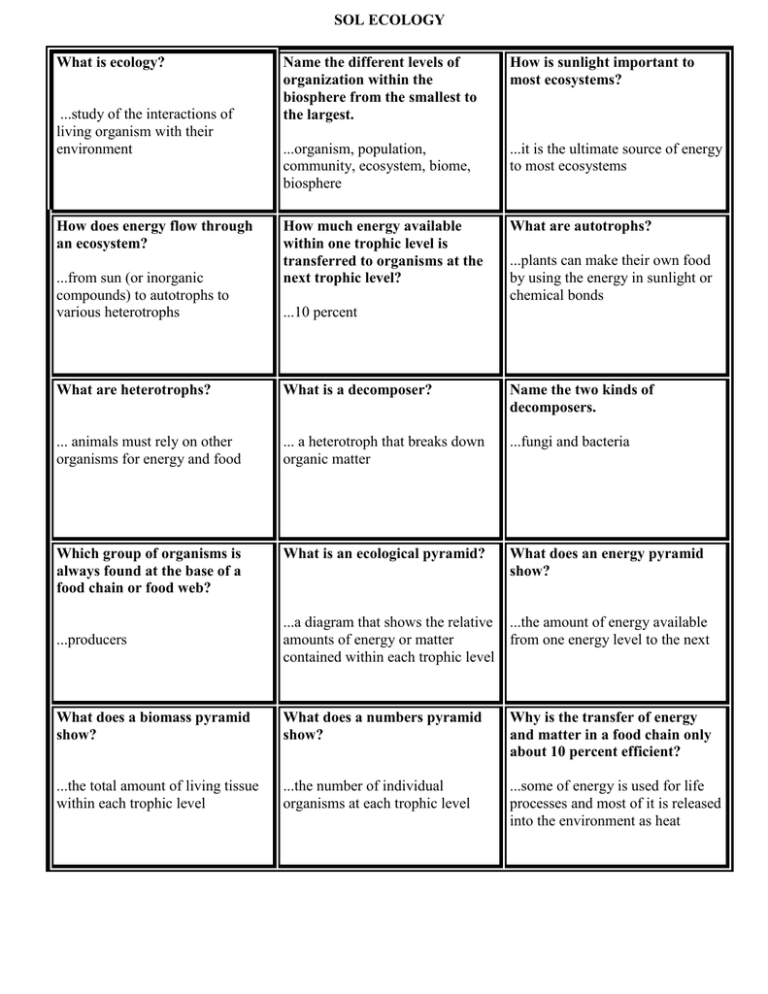
SOL ECOLOGY What is ecology? ...study of the interactions of living organism with their environment How does energy flow through an ecosystem? ...from sun (or inorganic compounds) to autotrophs to various heterotrophs Name the different levels of organization within the biosphere from the smallest to the largest. How is sunlight important to most ecosystems? ...organism, population, community, ecosystem, biome, biosphere ...it is the ultimate source of energy to most ecosystems How much energy available within one trophic level is transferred to organisms at the next trophic level? What are autotrophs? ...plants can make their own food by using the energy in sunlight or chemical bonds ...10 percent What are heterotrophs? What is a decomposer? Name the two kinds of decomposers. ... animals must rely on other organisms for energy and food ... a heterotroph that breaks down organic matter ...fungi and bacteria Which group of organisms is always found at the base of a food chain or food web? What is an ecological pyramid? What does an energy pyramid show? ...producers ...a diagram that shows the relative amounts of energy or matter contained within each trophic level ...the amount of energy available from one energy level to the next What does a biomass pyramid show? What does a numbers pyramid show? Why is the transfer of energy and matter in a food chain only about 10 percent efficient? ...the total amount of living tissue within each trophic level ...the number of individual organisms at each trophic level ...some of energy is used for life processes and most of it is released into the environment as heat List two ways in which water enters the atmosphere in the water cycle? ...evaporation and transpiration A group of individuals of the same species that live together in an area is called a Explain the process of nitrogen fixation. Bacteria that live in the soil and on plant roots called legumes convert nitrogen gas into ammonia. What are some of the similarities between the carbon cycle and the nitrogen cycle? Both have the atmosphere as a reservoir. Both involve plants as transformers of the nutrients What components make up the climate of an ecosystem? The Green house effect causes an increase in ...temperature and precipitation ....temperature A relationship in which one organism is helped and another organism is neither helped nor hurt A form of symbiosis in which both organisms benefit is called ...population All the biotic and abiotic factors in a pond form ....an ecosystem ..mutualism ...commensalism A type of symbiosis in which one organism benefits and the other is harmed is called Name the major abiotic factors that produce the main climate zones. What is the difference between an organism's habitat and its niche? temperature, precipitation, sunlight, humidity and wind habitat: where it lives ...parasitism niche: how it lives; its occupation What is secondary succession? What is primary succession? What are plankton? When disturbances of some kind changes an existing community without removing the soil. (cleared and plowed land; fire; Pioneer organisms (lichen) begin to grow on rocks (no soil) where no life has grown before. (after volcanic eruptions on the lava rock; after glacier melting on the rock) free-floating microscopic algae (phytoplankton) and animals (zooplankton) ECOLOGY The number of a single species per unit of area is known as The movement of individuals into an area if called The maximum number of organisms of a particular species that can be supported by an environment is called ...immigration ...population density ...carrying capacity What happens when the population grows larger than the carrying capacity? The scientific study of human population is called Explain how density independent limiting factors can affect populations. ...demography ..have similar effects on all individuals in a population regardless of the density of the population (droughts, flood, fire) What are density-dependent factors? What is ecological conservation? A resource that cannot be replenished by natural processes A limiting factor that depends on population size: particularly large populations living in a small area.(DENSE POPULATIONS) (competition, predation, parasitism, and disease) ...wise management of natural resources, including the preservation of habitats and wildlife A species whose population size is declining so rapidly that it could soon become extinct is said to be Which factor promotes competition in an ecosystem? What is the importance of the denitrification process? ... limited resources ...bacteria release nitrogen gas back into the atmosphere. FOOD PYRAMID CARRYING CAPACITY ...individuals begin to start dying ...nonrenewable .....endangered. FOOD WEB -------------------------------------- ECOLOGY
